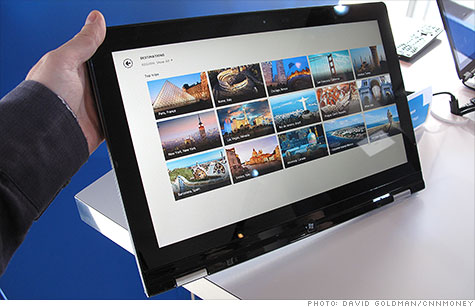Search News

Is the Lenovo Yoga an ultrabook or a tablet? Yes.
NEW YORK (CNNMoney) -- "Thin," "touch-enabled," "light-weight," "beautiful" and "appealing" aren't adjectives usually associated with personal computers -- but get ready. A new wave of ultrabooks and tablets coming this fall are about to change how the world perceives the PC.
At a demo event in New York on Tuesday, Intel (INTC, Fortune 500) showed off more than a dozen new ultrabook designs that are slated to go on sale later this year. They look like the same thin, light laptops as the first generation of ultrabooks, but Intel's new 22 nanometer "Core" processors enable a crucial new feature: touch.
Microsoft's (MSFT, Fortune 500) soon-to-be-released Windows 8 is touch-centric, favoring fingers as input devices over keyboards and mice.
That's why Intel designed a touch-enabled ultrabook in its Silicon Valley headquarters last year and it sent it off to PC makers as a reference design to replicate.
Many manufacturers simply added touch capabilities to the screen, but others were more creative. Asus designed a convertible ultrabook with two touchscreens -- one on the front and back of the lid -- allowing the device to fold up and become a tablet.
Lenovo came back with a blast from the past.
Before Apple's (AAPL, Fortune 500) iPad debuted, tablet computers were often laptops with keyboards that folded back behind the screen. They never took off, partly because of their bulk and poor touch capabilities. Now that the technology is vastly better and devices can be slimmed down, Lenovo is trying again with the Yoga.
Ultrabooks are clearly the future of laptops. They're plenty powerful -- Intel noted that they are on average 19 times more powerful than most three-year old laptops -- and the chipmaker still expects ultrabooks to represent 40% of laptop sales by the end of the year.
But are ultrabooks the future of the PC or just a stopgap before tablets take over completely?
Tablets -- okay, iPads -- have captured the world's attention and eaten into PC sales.
There aren't many Windows tablets out in the wild today, since Windows 7 isn't exactly the most touch-friendly operating system, but most major PC manufacturers are working on some form of Windows 8 tablet.
Most notably, Microsoft will begin selling a tablet of its own design in October. The Surface is a Windows 8 tablet with a case that folds down to become a keyboard.
That means PC tablets will be going head-to-head against ultrabooks this fall.
With many of the same features, consumers will be faced with a tough choice. They weigh about the same, and many ultrabooks aren't much thicker than a tablet. Both will sell for around $1,000, though a handful of non-touch-enabled (and noticeably heavier) ultrabooks are going to be priced as low as $700.
The keyboard is the biggest differentiator. You can type on ultrabooks on your lap, but tablets really need to be propped up and connected to an external keyboard for any real productivity. Even the Surface needs a table for the gadget's kickstand and keyboard to work properly.
Intel thinks the keyboard's importance will fade in the coming years. The company is working on a next-generation of processors capable of supporting natural user interfaces such as facial expressions and voice commands.
Keystrokes and even touch will one day be supplanted by a look, a gesture, or speech, the company believes.
That means the already-blurring lines between laptops, tablets and phones will become even fuzzier. ![]()